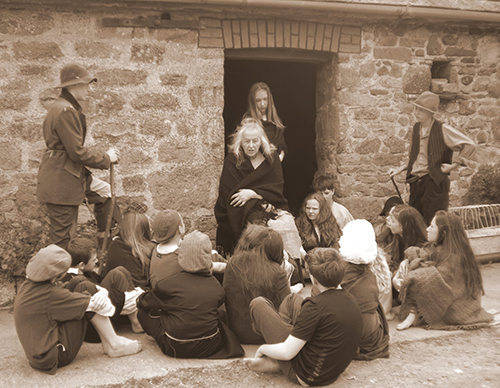
The illustration is of a Seanchai, courtesy of Ballyneale National School, Co. Tipperary
Seanchaí (shan-a-key) were traditional Irish storytellers and the custodians of history for centuries in Ireland.
Notice the attention being given by the listeners – and the attention is to the story.
The gift of the storyteller is to not get in the way of the story!
Storytelling has always been at the heart of being human because it serves some of our most basic needs: passing along our traditions, confessing failings, healing wounds, engendering hope, and strengthening our sense of community.
Stories hold our truth, who we are as an individual, a family, a nation, a culture.
We are forever telling stories; stories to enlighten, stories to remember, stories to invigorate and renew, stories to humour us.
Stories are imaginative, of course, both in the telling and the hearing.
However, they also offer substance. The more we hear and the better we listen, the better sense we get of what life might be about, even why we are here.
To lose track of our stories is to be profoundly impoverished not only humanly but also spiritually.
Our Gospels are stories.Jesus used storytelling as a major resource.
In this Sunday’s Gospel (Mk 4: 26 – 34) we have stories of seeds being scattered; seeds sprouting and growing; trees providing shelter.
It is all action, “Once upon a time seed was scattered . . .”
In the first centuries monks who could not read had a passage read to them multiple times, letting it saturate their imaginations, and they would return to their cells and pray with it, allowing it to unfold in their minds.
Might that be the role of the preacher, to saturate our imaginations?
Might the role of the preacher be a storyteller rather than a theologian (or, heaven help us, a dogmatist!)


